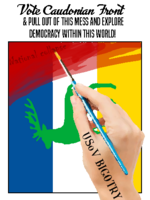Caudonian Crisis
| Caudonian Crisis | ||||||||
|---|---|---|---|---|---|---|---|---|
 A poster from the Caudonian Front, calling for the 'preservation' of Caudonia and urging the public to report suspicious activity to the police | ||||||||
| ||||||||
| Belligerents | ||||||||
|
|
| |||||||
| Commanders and leaders | ||||||||
|
| non-centralised |
| ||||||
The Caudonian Crisis was a political conflict between the Principality of Caudonia, the United Sovereignties, and the Union of Crimsonian Socialist Republics in late 2019. The term was coined by Ned Fram.
Background
First phase

Disagreements began around 15 November after Caudonia was accused of being a Nazi-sympathist state by several member states of the United Sovereignties for its relatively tolerant attitude toward individuals of right wing ideologies and allowing them to possess citizenship under the 'freedom of expression' clause in the Constitution of Caudonia. This marked the start of scepticism within Caudonia about its membership in the United Sovereignties. Although this was in the background, as the Caudonian government and many Caudonians believed the issue could be easily resolved.
Second phase
The was a significant increase in tensions on 22 November after Ashton Mattingly posted a tweet sympathising with the Chinese Communist Party and calling protesters involved in the Hong Kong protests 'terrorists'. Prince William and Ned Fram, expecting a reasonable debate, questioned his point. In response to Fram bringing up the controversial land seizures in Zimbabwe and the Gukurahundi genocide as recent examples of socialist genocides (which Mattingly was denying), Mattingly called him 'mentally defective', probably because of the fact Fram has autism. Several micronations withdrew support of the Union of Crimsonian Socialist Republics in response to Mattingly's comments. Mattingly refused to apologise for this incident when approached by Fram.
In response to the Mattingly incident, the Caudonian Front drafted a policy of opening up dialogue with the United Sovereignties in an attempt to improve relations. If relations could not be improved, the Front would consider a so-called 'unilateral declaration of independence' from the organisation. From 24 November, talks took place between the United Sovereignties and the Caudonian government to improve relations and prevent any 'UDI', however, the Caudonian Front still considered declaring 'independence' from the organisation as long the UCSR remained a member state.
On 27 November, the UCSR announced that it would unite with the Nova CSR. This brought about talks within Caudonia of direct interference in the domestic affairs of the UCSR in order to create resistance and split Nova from the UCSR. On 28 November, Mattingly was removed from the United Sovereignties. This marked a major victory for Caudonia and was celebrated by many Caudonians because of his past disputes with Caudonia. Many believed that that would be the beginning of the end for the Caudonian Crisis. On 4 December, the Second Empire of Brazil, a micronation previously unknown to many Caudonians, called Caudonia a 'Nazi state' on Twitter unprovoked. They withdrew this statement several days later.
Third phase
After attempts to resolve the situation were made quietly, clashes occurred publicly on Twitter on 12 December. Clashes were primarily between Ned Fram and Kay Mattingly, Ashton Mattingly's partner. The situation calmed down after Caudonian Front Vice President, Gabriel Sebastian, attempted to mediate. Rumours that Kay Mattingly withdrew from the Micronational community as a result were circulated in its aftermath.
An emergency calling of the Parliament of Caudonia was called after this conflict, which resulted in Caudonia's withdrawal from the United Sovereignties.